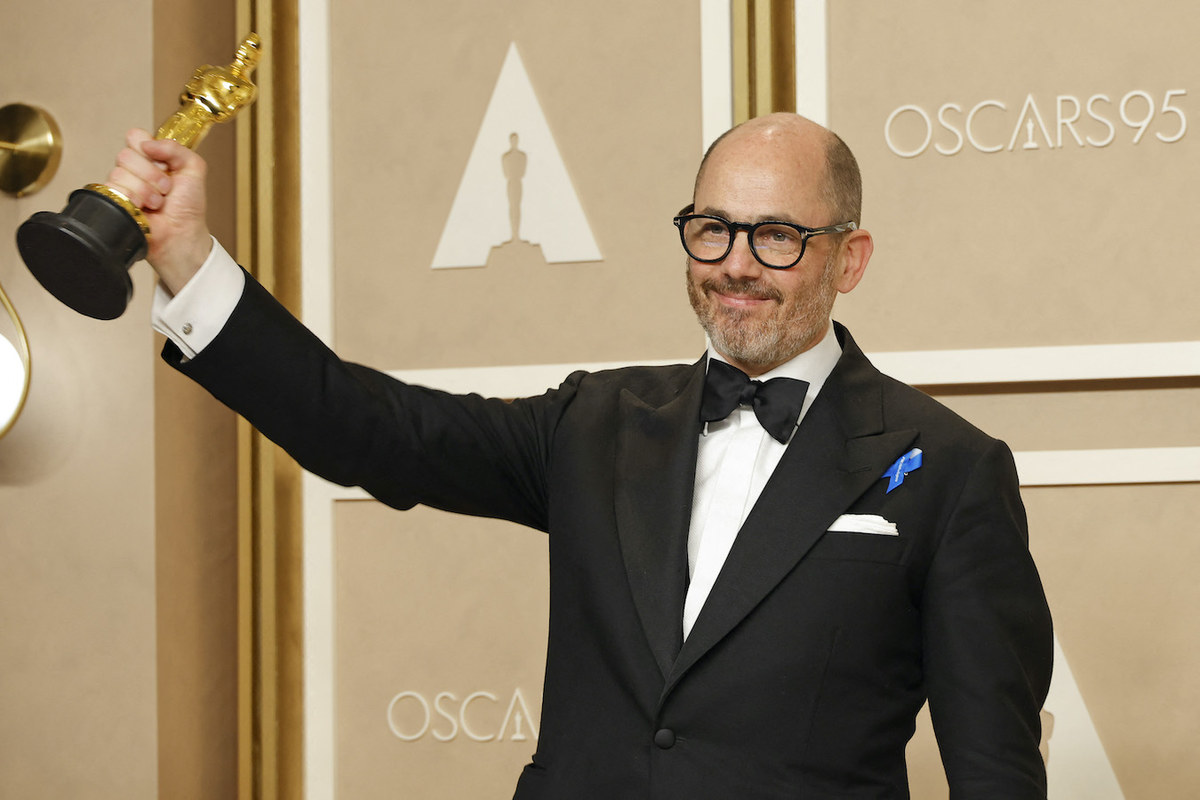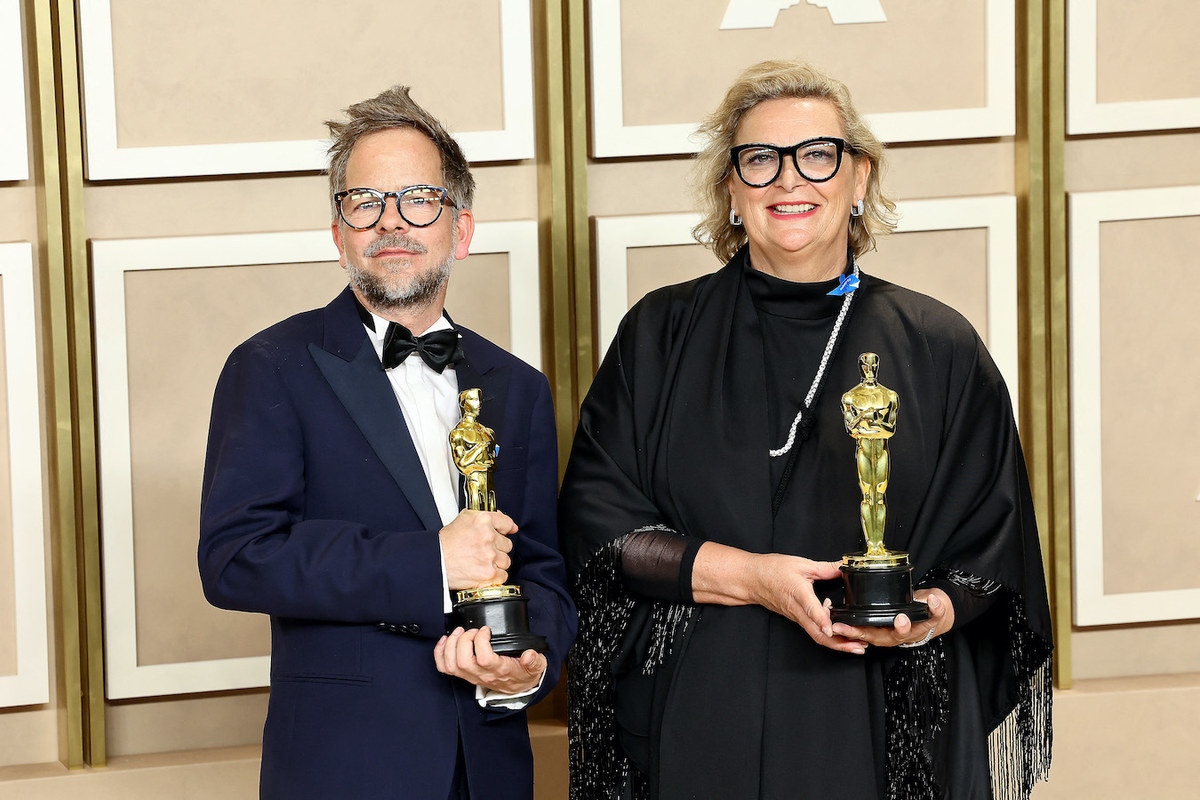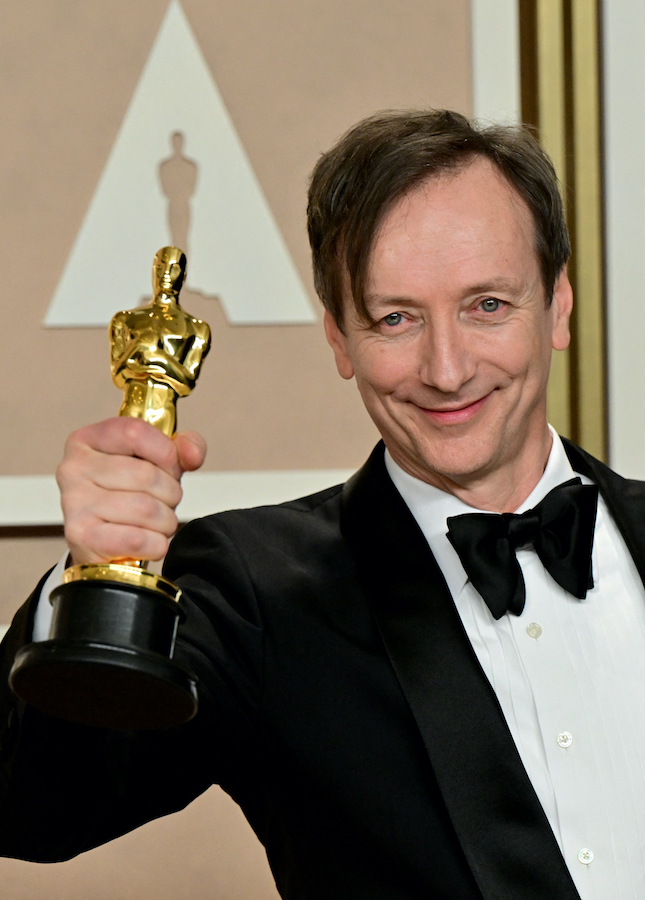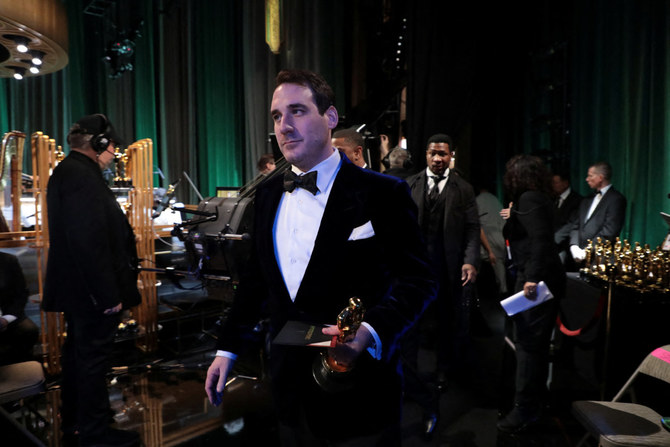BERLIN: A wrenching German adaptation of the classic war novel “All Quiet on the Western Front” clinched the Academy Award for best international feature Sunday with its timely anti-militarist message.
Nearly a century after the book by Erich Maria Remarque was published, the Netflix production capped a triumphant march through awards season with the Oscar win.
It was the first German-language film in Academy history to be up for best picture, among a surprise nine nominations.

(L-R) Christian M. Goldbeck, winner of Best Production Design award, Edward Berger, winner of the Best International Feature Film award and James Friend, winner of the Best Cinematography award, each for "All Quiet On The Western Front" attend the Governors Ball. (AFP)
The last German winner of best international feature (a category then known as best foreign language film) was “The Lives of Others” in 2007.
Swiss director Edward Berger, 52, thanked his star Felix Kammerer, an Austrian stage actor making his cinematic debut, saying: “Without you, none of us would be here.”
In “All Quiet,” World War I is viewed through the eyes of teenage German soldier Paul Baeumer (Kammerer), a volunteer on the Western front.

Edward Berger, winner of the Academy Award for Best International Feature Film for "All Quiet on the Western Front", poses in the press room during the 95th Annual Academy Awards. (AFP)
Once in the trenches, he quickly becomes aware of the absurdity of war and the patriotic brain-washing that got him there.
In one of several graphic battle scenes which drew comparisons with Steven Spielberg’s “Saving Private Ryan,” Baeumer recognizes his enemy’s shared humanity.
A year into Russia’s invasion of Ukraine, German Culture Minister Claudia Roth hailed Berger’s epic when it scooped seven of Britain’s BAFTA prizes last month as “unfortunately the right film at the right time.”

A scene from Netflix's film "All Quiet on the Western Front". (Screen grab from Netflix's official teaser video)
“It tackles the horrors of a war in the heart of Europe in a harrowing way... with unflinching images no one will easily forget,” she said.
Berger told AFP in Berlin last September as the picture premiered that the story was ripe for a fresh take.
“My film stands out from American or British (war) films made from the point of view of the victors,” he said.

(L-R) Ernestine Hipper and Christian M. Goldbeck, winners of the Best Production Design award for "All Quiet on the Western Front," pose in the press room during the 95th Annual Academy Awards. (AFP)
“In Germany, there is always this feeling of shame, mourning and guilt (surrounding war). It was important for me to present this perspective.”
Published in 1929, the novel is one of the most influential examples of pacifist literature ever written, translated into more than 60 languages.
Just one year after the book came out, a US film adaptation by Lewis Milestone was released which would win the Academy Awards for best picture and best director.
But its subversive message saw the work banned in Germany and targeted in the 1933 book burnings by the Nazis, who accused it of “betraying soldiers.”
Berger was previously best known for his 2018 Emmy-nominated minizeries “Patrick Melrose” starring Benedict Cumberbatch.

A cover of the book by Erich Maria Remarque, as advertised on Amazon.com.
He said he was pushed to accept “All Quiet” by his teenage daughter, who had just studied this book like several generations of high school students before her.
His adaptation of Remarque’s work aimed to show “the perspective of the vanquished,” he said.
This includes aspects not covered in the book: the signing of the armistice after World War I and the harsh conditions imposed on the Germans that later fed Nazi propaganda to justify nationalism and the outbreak of World War II.

German pianist Volker Bertelmann poses with the Oscar for Best Music (Original Score) for "All Quiet on the Western Front" in the press room during the 95th Annual Academy Awards. (AFP)
German critics noted parallels with the current Russian onslaught in a story about a soldier fighting for a nationalist lie.
Martin Schwickert of the RND media group called the film “frighteningly current in light of the Ukraine war,” saying it “made plain what war means for those who have to fight it.”
The film proved popular in its home market, but reviews were mixed — and some were downright savage.
“In Germany, even after 100 years, one can’t see the difference between a good and a bad war film,” the daily Frankfurter Allgemeine Zeitung said.
The top-selling Bild however hailed the film as “brilliantly shot, wonderfully acted and packing a strong emotional punch.”
“A film everyone should see, especially in these times.”
List of 2023 Oscar winners
-
Best supporting actor: Ke Huy Quan, “Everything Everywhere All at Once”
-
Best supporting actress: Jamie Lee Curtis, “Everything Everywhere All at Once”
-
Best animated feature: “Guillermo del Toro’s Pinocchio”
-
Documentary feature: “Navalny”
-
Live action short: “An Irish Goodbye”
-
Cinematography: James Friend, “All Quiet on the Western Front”
-
Makeup and hairstyling: “The Whale”
-
Costume design: “Black Panther: Wakanda Forever”
-
International feature film: “All Quiet on the Western Front” (Germany)
-
Documentary short: “The Elephant Whisperers”
-
Animated short: “The Boy, the Mole, the Fox and the Horse”
-
Production design: “All Quiet on the Western Front”
-
Music (original score): Volker Bertelmann, “All Quiet on the Western Front”
















